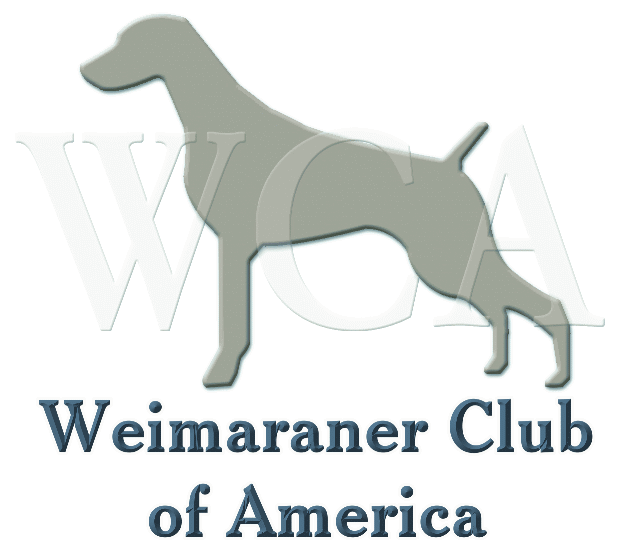
The Weimaraner Club Of America
Field Events
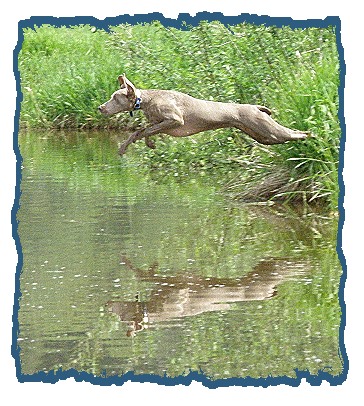 Field events were developed to test hunting dogs in the activity that they were originally bred to do. Weimaraners were originally bred to be versatile hunting dogs. A versatile hunting dog aids the hunter in all aspects of game management both before and after the shot. Duties of a versatile hunting dog include pointing, tracking and retrieving game on land and in the water.
Field events were developed to test hunting dogs in the activity that they were originally bred to do. Weimaraners were originally bred to be versatile hunting dogs. A versatile hunting dog aids the hunter in all aspects of game management both before and after the shot. Duties of a versatile hunting dog include pointing, tracking and retrieving game on land and in the water.
The venues available for testing versatile hunting abilities include: AKC Pointing Breed Field Trials, AKC Pointing Breed Hunting Tests, AKC Retrieving Breed Hunting Tests, WCA Shooting Ratings, WCA Retrieving Ratings and Versatile Hunting Dog tests through the North American Versatile Hunting Dog Association (www.navhda.org) and the Versatile Hunting Dog Federation (www.vhdf.org). Each venue focuses on different aspects of the duties of a versatile hunting dog. In all the venues other than Field Trials, the dogs are judged against a standard of performance and all dogs may receive a qualifying score if they meet that standard. In Field Trials, the dogs are judged against each other and placements 1st - 4th are awarded based on the decision of the judges.
Am I Eligible to Participate?
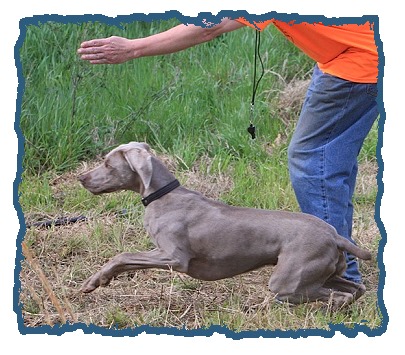
Pointing Breed Field Trials
Dogs six months of age or older are eligible to participate in Pointing Breed Field Trials.
Dogs with a Purebred Alternative LIsting Program/indefinite Listing Privilege (PAL/ILP) are not eligible to participate.
Dogs with Conditional registration are not eligible to participate.
Spayed and neutered dogs are eligible to participate
Dogs with Limited Registration are eligible to participate
Bitches in season are allowed at the club’s discretion
Pointing & Retrieving Breed Hunt Tests
Dogs six months of age or older are eligible to participate in Pointing Breed Hunt Tests
Dogs with a Purebred Alternative Listing Program/indefinite Listing Privilege (PAL/ILP) are eligible to participate.
Dogs with Conditional registration are eligible to participate.
 Spayed and neutered dogs are eligible to participate
Spayed and neutered dogs are eligible to participate
Dogs with Limited Registration are eligible to participate
Bitches in season are not allowed participate and are not allowed on the grounds.
WCA Shooting & Retrieving Ratings
Any Weimaraner with an individual AKC number, including an AKC Limited Registration, or an ILP number who has obtained the age of six (6) months on the first day of the tests may compete for any or all of the ratings offered.
Ratings Tests are open to all Weimaraners whose owners and co-owners are all members of the Weimaraner Club of America in good standing. Any member with an outstanding balance owed to the WCA may not compete in any WCA event until the balance is paid in full.
Spayed bitches or neutered males may compete for and receive ratings. Weimaraners that have disqualifying faults (as listed in the current standard for the breed) shall be eligible to compete for or receive ratings provided they are spayed or neutered. PRIOR to being entered in a ratings test, Weimaraners with disqualifying faults must be certified by the National Office as being spayed or neutered and receive a DQF Number. All Weimaraners with AKC ILP numbers are allowed to participate without applying to the National Office.
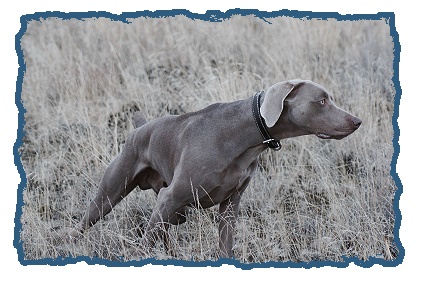 To receive a DQF Number owners must present a copy of the dog’s AKC Registration Certificate or AKC recognized foreign registration certificate, and a copy of the dog’s spay or neuter verification from their veterinarian to the WCA National Office, PO Box 489, Wakefield, RI 02880, Fax# 401-789-8279.
To receive a DQF Number owners must present a copy of the dog’s AKC Registration Certificate or AKC recognized foreign registration certificate, and a copy of the dog’s spay or neuter verification from their veterinarian to the WCA National Office, PO Box 489, Wakefield, RI 02880, Fax# 401-789-8279.
North American Versatile Hunting Dog Association
Only NAVHDA registered dogs are eligible to participate in NAVHDA tests. NAVHDA tests are open to eligible dogs from the International publication date of the test announcement. With the exception of the Invitational Test, membership in NAVHDA is not a prerequisite for entering a dog in a NAVHDA test. However, members may be afforded reduced rates on entry fees.
Dogs are eligible for a Natural Ability Test up until, and including, the day they reach 16 months of age. Dogs over 16 months may be run for evaluation only. Dogs over 16 months may only be run if space is available. No prize classification can be awarded the dog run for evaluation.
There are no age restrictions on dogs entered in the Utility Preparatory Test, Utility Test or the Invitational Test. Only invited dogs are eligible to participate in the Invitational Test.
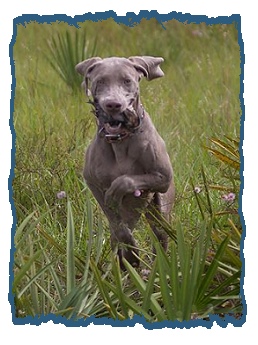
No restrictions are placed on the number of times a dog may be tested, provided eligibility requirements are met. Repeated tests are encouraged throughout the dog’s development.
Dogs run in the Invitational Test must have DNA on file with NAVHDA or DNA applied for, through NAVHDA, prior to the closing date of entry and the primary owner of each entry must be a NAVHDA International member. Bitches “in season” may be run in NAVHDA tests. These dogs will be run last at each phase of testing. (Note: “In season” bitches will be run last at each phase of testing, on the last day of Invitational testing.)
Versatile Hunting Dog Federation
Any current VHDF member may participate in VHDF sanctioned events. In order to enter or handle a dog in a VHDF test, the owner and handler must be a member of VHDF. There are no registry requirements as VHDF does not have a registry function. Any registered dog may be entered in a VHDF test. Registered purebred dogs will be classified within the VHDF database according to breed. Non-registered dogs may also participate in VHDF events and will be classified in the "Other" category.
Field Training Resources
All About AKC Hunt Tests
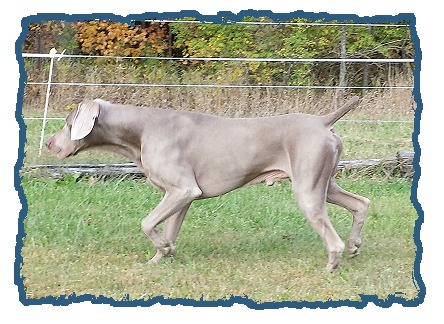
Pointing Resources
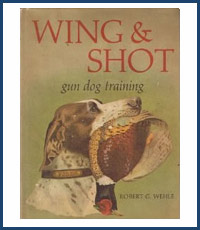 Wing and Shot by Robert G. Wehle
Wing and Shot by Robert G. Wehle
Wing & Shot" is an easy to read, step-by-step account of how to train a fine shooting dog.
This book contains, in condensed form, all the information necessary to develop a 10-week-old puppy into a completely finished gun dog. The most inexperienced beginner can achieve successful results from these easy to learn training methods that have been used by the author in producing the country's top gun dogs for over 20 years.
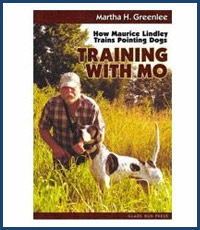 Training With Mo: How Maurice Lindley Trains Pointing Dogs by
Maurice Lindley
Training With Mo: How Maurice Lindley Trains Pointing Dogs by
Maurice Lindley
Accomplished trainer Maurice Lindley walks you step by step through training a young dog to an accomplished hunter or trialer. Pointers and Flushing breeds are discussed.
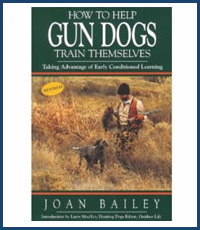 How to Help Gun Dogs Train Themselves by Joan Bailey
How to Help Gun Dogs Train Themselves by Joan Bailey
Take advantage of early conditioned learning. How to Help Gun Dogs Train Themselves by Joan Bailey has over 200 information packed pages and more than 130 photographs that show you exactly how to bring your pup along.
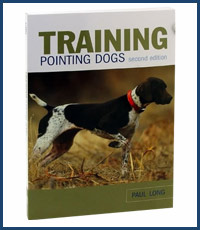 Training Pointing Dogs - Second Edition by Paul Long
Training Pointing Dogs - Second Edition by Paul Long
In Paul Long’s heyday as a dog trainer, he was a true “guru” before anyone even used that word to describe an oft-sought expert. “What does Paul Long say about this?” was the frequent refrain on training courses, and multiple answers were provided in the original edition of this book.
Now reissued, Training Pointing Dogs again delivers the sage guidance of this master dog trainer. In simple question–and–answer format, Long addresses the questions most asked by trainers, professional and amateur alike. Should I try to train my dog myself? Do I need to use a whistle? How do I deal with a dog that sulks after correction? What should I do if my dog will point a dead bird but not pick up and retrieve it?
Paul Long’s answers to these questions are practical and filled with good sense and the subtle, wry humor of a wily veteran. His answer to the last question above is a delightful example: “Retrieving is a pretty sight and desirable. Elsewhere in the book you will find suggestions for encouraging your dog to retrieve. But if you have no success, remember that it is a rare sight to see a man point a bird. However, many men have a back strong enough to lean down and pick up a bird that a dog has located and pointed dead.”
The late Paul Long was one of the most innovative pointer trainers in the country. His techniques are still in use, and they continue to make a difference in the field. He died in 2003.
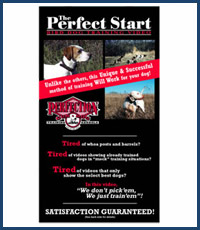 The Perfect Start by Jon & Cindy Haan
The Perfect Start by Jon & Cindy Haan
This is the first video of the PERFECT BIRD DOG SERIES . It has taken 12 months to shoot and edit (Most videos are shot in a matter of a couple of days). You get see dogs worked and see their reaction in all situations and see how we handle them. For example when we are teaching a dog to HERE it is not done with a dog that already knows the command. You get to see what happened the very first time we start teaching each command. You also will see how each dog responds in the first introduction to the gun and birds. It doesn't matter if your dog is 4 months or 4 years, if your dog needs to begin its hunting or field trial career this is the way to get it done. We are showing you exactly what we would do with your dog here at PERFECTION KENNELS. These are not the methods of the past. These are the methods used by one of the most recognized kennels, worldwide, for their training expertise. You will see for the FIRST TIME the methods that have made Jon and Cindy Hann so successful.
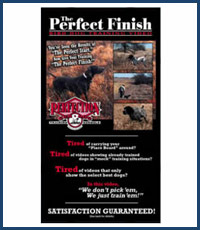 The Perfect Finish by Jon & Cindy Haan
The Perfect Finish by Jon & Cindy Haan
The second in the series. This video continues where the START ends. This video is developed using our proven methods of getting your dog finished to steady to Wing or Wing and Shot and how to get it done and keep your dog happy. It again took many months of shooting footage and editing to get it just perfect. This thing is 4 hours in length and filled with vast amounts of training knowledge. You watch it, study it, learn to be a great trainer. As with the START WE USE DOGS THAT HAVE NEVER DONE IT BEFORE, so you get to see it as it happens. You see many different temperaments and how we handle each one.
Retrieving Resources
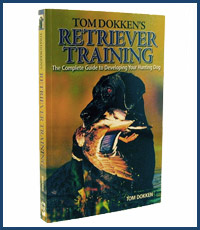 Tom Dokken's Retriever Training by Tom Dokken
Tom Dokken's Retriever Training by Tom Dokken
In Tom Dokken's Retriever Training, one of America’s leading trainers helps you channel your hunting dog’s huge ambition so he works for you, the way you want, and does so happily. After using the time-tested methods in Tom Dokken’s Retriever Training, you’ll have a reliable retriever that:
• Obeys commands on and off leash
• Retrieves birds to hand
• Remains steady to shot
• Quarters and flushes upland game
• Finds downed birds
• Takes hand signals
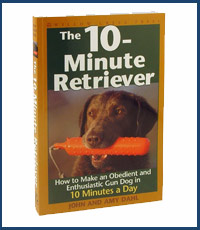 The 10 Minute Retriever by John and Amy Dahl
The 10 Minute Retriever by John and Amy Dahl
The 10 Minute Retriever reflects the authors’ belief that daily ten-minute training sessions best suit a retriever's attention span and lead to rapid learning. This book is easy to use for the absolute beginner and yet deeply informative for the serious student of retriever training. The text has the information aspiring retriever trainers need: how to force fetch, how to set up tests in the field, and how to use a electronic collar humanely and effectively. The emphasis of this training method is on obtaining necessary control and good manners while maximizing the dog's enthusiasm by establishing training situations where the dog desires to cooperate. Primary importance is placed on developing and enhancing the desire to retrieve, from early puppyhood onward. The method presented provides a solid foundation to the dog and owner continuing to advanced retriever training (blind retrieves and competition).
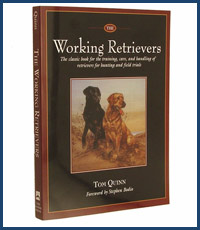 The Working Retrievers by Tom Quinn
The Working Retrievers by Tom Quinn
THE WORKING RETRIEVERS covers every aspect of the training of dogs for hunting and field trials, from the beginning to the most advanced levels. In its earlier sections, the book surveys the various breeds of retrieving dogs – Labradors, Chesapeakes, and others – and their history. Quinn then takes us, step by step, through the entire training process for the successive levels of trial competition and hunting.
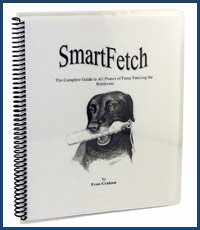 SmartFetch by Evan Graham
SmartFetch by Evan Graham
Evan Graham’s groundbreaking book SmartFetch examines the history of force fetching dogs, its goals and purposes, while laying a solid foundation for a fully trained dog. All obedience issues associated with it are fully explained, plus all phases of the program, from the teaching of “hold” all the way to Water Force. No book has ever been so complete in its discussion about, and instruction for, doing it yourself.
Video from the 2011 Novice Field Seminar
